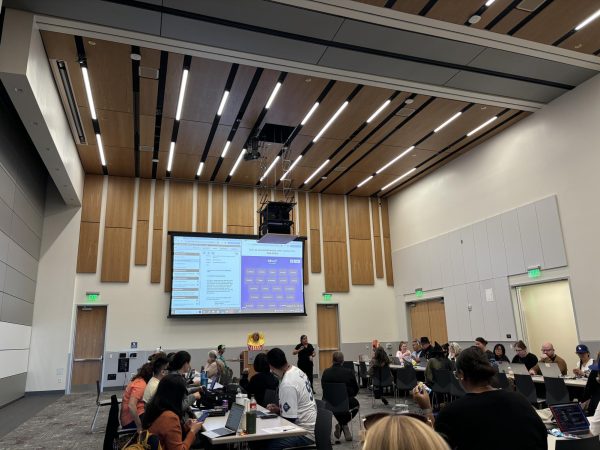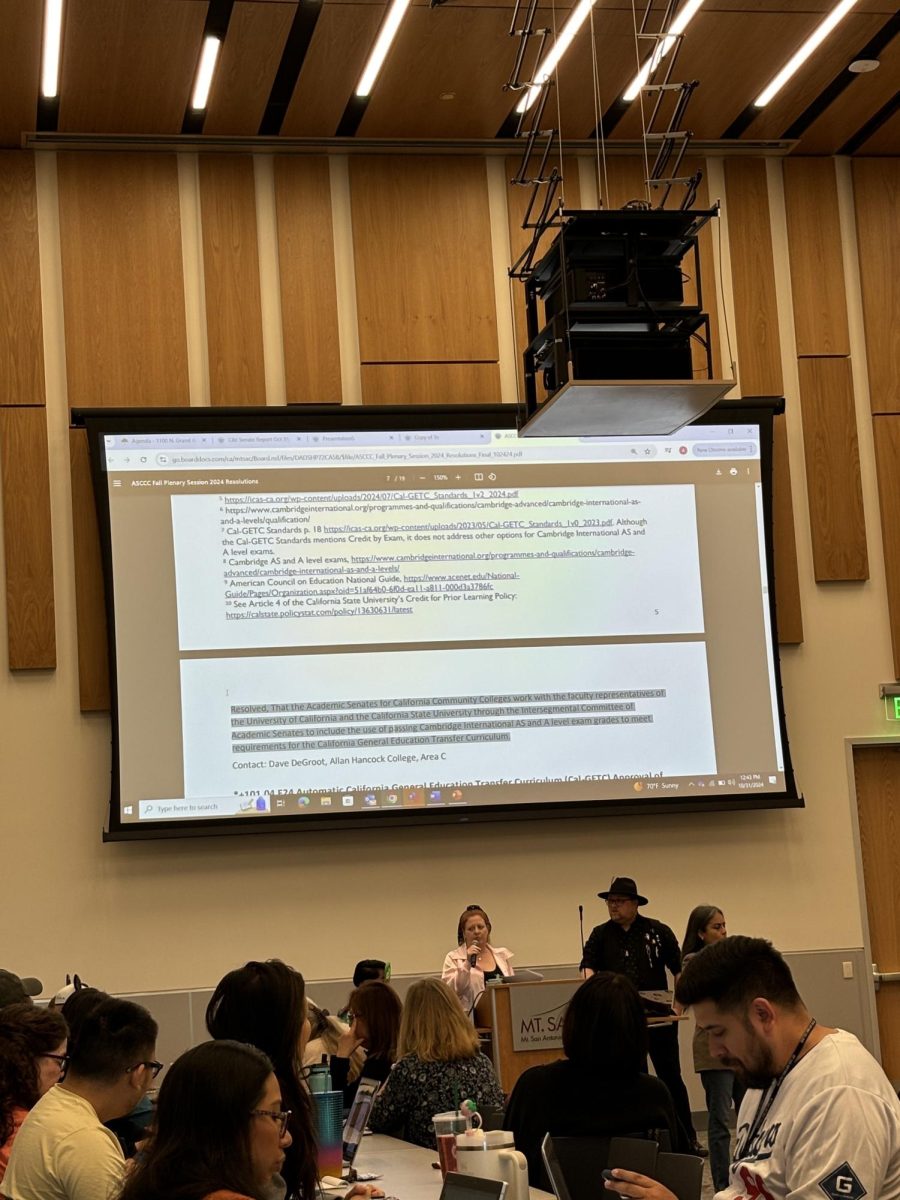Last Thursday, the Academic Senate met at 11:30 a.m. to vote on the new Course Outline of Record (COR), discuss stringent Brown Act regulations and address the implementation of AI detection on Canvas.
Department chair for political science Kelly Rivera, made it clear last Thursday that adopting student learning outcomes (SLO) for the COR in Title 5 would be an “assault on academic freedom.”
After reading the first proposed resolution, comments from the Outcomes Committee reinforced her argument.
“Should student learning outcomes become mandatory in the COR, this would require them to pass through the curriculum review process,” Sara Mestas said, reading from comments
Thursday, the Academic Senate met at 11:30 a.m. to vote on the new Course Outline of Record (COR), discuss stringent Brown Act regulations and address the implementation of AI detection on Canvas.
Department Chair for political science Kelly Rivera, made it clear last Thursday that adopting student learning outcomes (SLO) for the COR in Title 5 would be an “assault on academic freedom.”
After reading the first proposed resolution, comments from the Outcomes Committee reinforced her argument.
“Should student learning outcomes become mandatory in the COR, this would require them to pass through the curriculum review process,” said Sara Mestas, reading from the comments.
Additionally professors would have to be told what to measure in their classrooms, considering their SLOs would now be regulated.
When it came time for the vote, the Academic Senate unanimously voted against the resolution.
Rivera, also Mt. SAC’s Academic Senate delegate, will attend the Academic Senate for California Community College fall plenary to vote against this resolution.
In addition to their current responsibilities, the AS faces further regulations under the Brown Act.
The Brown Act mandates that committees hold all meetings in person to ensure public accessibility, making online Zoom meetings problematic.
This transition from online to in-person meetings is “a higher standard than we’ve had before and will require training for software,” said Rivera.
This change is legally motivated; however, not all community colleges are held to the same standard as Mt. SAC.
“I’ve worked at other community colleges, and the senate was never held accountable by the Brown Act, so why are we?” said psychology professor Cara Tan.
The senate decided not to rush its decision on Friday, opting instead to seek legal advice on fully adopting the Brown Act at Mt. SAC.
President Tania Anders agreed and reiterated, “I want to do this right.”
Anders also noted that AI detection on Canvas is a significant topic for discussion but opted to save it for the next meeting.
She told SACMedia that the software, called K16 Solutions, has already been implemented.
“The funding for it is coming out of the instruction office,” said Anders, adding that the Ed Tech Committee has reviewed various software options, and the system was approved by the Board of Trustees.
This change was prompted by the rise of AI applications that can answer school assignments, a particular concern for online courses where teachers may be less aware of students’ work behaviors and quality.
“I think it’s really good to use as a resource, but it can’t be a substitute for doing the actual work,” said Anders.
She emphasized that teachers are also learning how to use AI effectively, recognizing that AI can be a valuable resource when used wisely.
However, “If students are just copying and pasting their homework, then yes, their grades should suffer,” Anders said.
The full Academic Senate will meet again on Nov. 14 to discuss Brown Act compliance and review the results of the fall plenary.
Last Thursday, the Academic Senate met at 11:30 a.m. to vote on the new Course Outline of Record (COR), discuss stringent Brown Act regulations and address the implementation of AI detection on Canvas.
Department Chair for political science Kelly Rivera, made it clear last Thursday that adopting student learning outcomes (SLO) for the COR in Title 5 would be an “assault on academic freedom.”
After reading the first proposed resolution, comments from the Outcomes Committee reinforced her argument.
“Should student learning outcomes become mandatory in the COR, this would require them to pass through the curriculum review process,” said Sara Mestas, reading from the comments.
Not only that, professors would have to be told what to measure in their classrooms, considering their SLOs would now be regulated.
When it came time for the vote, the Academic Senate unanimously voted against the resolution.
Rivera, also Mt. SAC’s Academic Senate delegate, will attend the Academic Senate for California Community College fall plenary to vote against this resolution.
In addition to their current responsibilities, the AS faces further regulations under the Brown Act.
The Brown Act mandates that committees hold all meetings in person to ensure public accessibility, making online Zoom meetings problematic.

This transition from online to in-person meetings is “a higher standard than we’ve had before and will require training for software,” said Rivera.
This change is legally motivated; however, not all community colleges are held to the same standard as Mt. SAC.
“I’ve worked at other community colleges, and the senate was never held accountable by the Brown Act, so why are we?” said psychology professor Cara Tan.
The senate decided not to rush its decision on Friday, opting instead to seek legal advice on fully adopting the Brown Act at Mt. SAC.
President Tania Anders agreed and reiterated, “I want to do this right.”
Anders also noted that AI detection on Canvas is a significant topic for discussion but opted to save it for the next meeting.
She told SACMedia that the software, called K16 Solutions, has already been implemented.
“The funding for it is coming out of the instruction office,” said Anders, adding that the Ed Tech Committee has reviewed various software options, and the system was approved by the Board of Trustees.
This change was prompted by the rise of AI applications that can answer school assignments, a particular concern for online courses where teachers may be less aware of students’ work behaviors and quality.
“I think it’s really good to use as a resource, but it can’t be a substitute for doing the actual work,” said Anders.
She emphasized that teachers are also learning how to use AI effectively, recognizing that AI can be a valuable resource when used wisely.
However, “If students are just copying and pasting their homework, then yes, their grades should suffer,” Anders said.
The full Academic Senate will meet again on Nov. 14 to discuss Brown Act compliance and review the results of the fall plenary.
.
Not only that, professors would have to be told what to measure in their classrooms, considering their SLOs would now be regulated.
When it came time for the vote, the Academic Senate unanimously voted against the resolution.
Rivera, also Mt. SAC’s Academic Senate delegate, will attend the Academic Senate for California Community College fall plenary to vote against this resolution.
In addition to their current responsibilities, the AS faces further regulations under the Brown Act.
The Brown Act mandates that committees hold all meetings in person to ensure public accessibility, making online Zoom meetings problematic.
This transition from online to in-person meetings is “a higher standard than we’ve had before and will require training for software,” said Rivera.
This change is legally motivated; however, not all community colleges are held to the same standard as Mt. SAC.
“I’ve worked at other community colleges, and the senate was never held accountable by the Brown Act, so why are we?” said psychology professor Cara Tan.
The senate decided not to rush its decision on Friday, opting instead to seek legal advice on fully adopting the Brown Act at Mt. SAC.
President Tania Anders agreed and reiterated, “I want to do this right.”
Anders also noted that AI detection on Canvas is a significant topic for discussion but opted to save it for the next meeting.
She told SACMedia that the software, called K16 Solutions, has already been implemented.
“The funding for it is coming out of the instruction office,” said Anders, adding that the Ed Tech Committee has reviewed various software options, and the system was approved by the Board of Trustees.
This change was prompted by the rise of AI applications that can answer school assignments, a particular concern for online courses where teachers may be less aware of students’ work behaviors and quality.
“I think it’s really good to use as a resource, but it can’t be a substitute for doing the actual work,” said Anders.
She emphasized that teachers are also learning how to use AI effectively, recognizing that AI can be a valuable resource when used wisely.
However, “If students are just copying and pasting their homework, then yes, their grades should suffer,” Anders said.
The full Academic Senate will meet again on Nov. 14 to discuss Brown Act compliance and review the results of the fall plenary.


